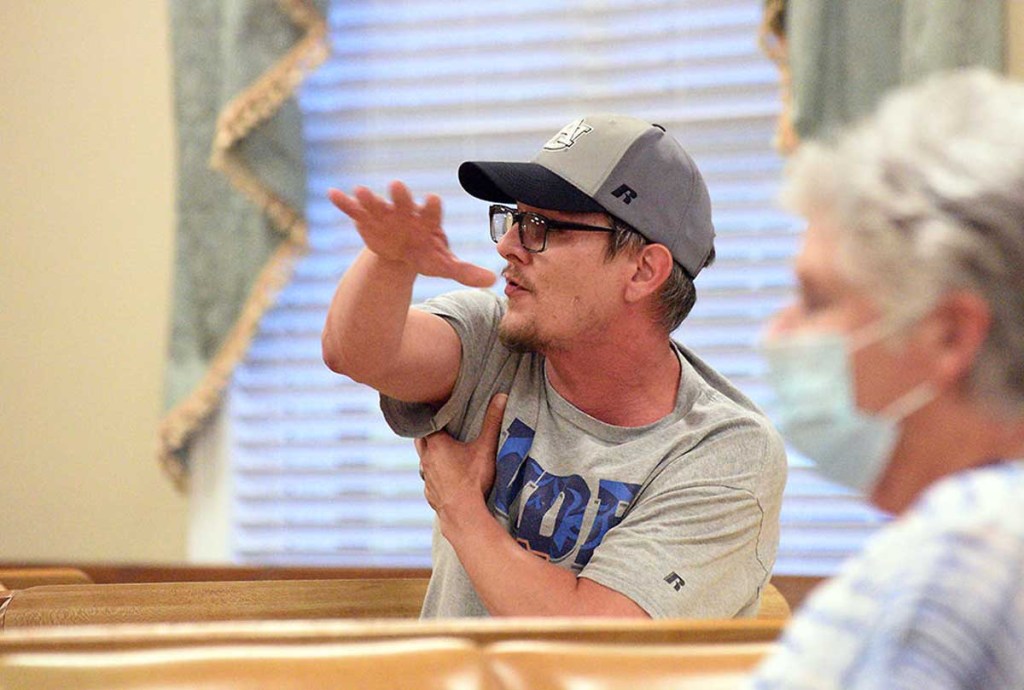‘Not a luxury anymore’ Baileyton pushing for action on broadband
Published 2:35 pm Tuesday, June 2, 2020

- Baileyton internet meeting
BAILEYTON — Baileyton area residents voiced their frustrations over slow or no internet access at the town council meeting Monday night. The issue has been a problem in the area for a long time, but the response to COVID-19 – shutting down schools and workplaces – highlighted the need for broadband internet in rural areas.
Among the complaints from residents were that broadband service is unavailable or slow and expensive when it is available.
Trending
Mayor Johnny Dyar said even before the COVID-19 pandemic he was getting calls two or three times a week from people wanting to know if there is anything the town can do to get better internet access.
And then it got worse.
“It was kind of amazing to me, I have a grandson who’s 12 years old, and they sent him home from school and told him to do his homework through internet,” said Dyar. “Well, half of Alabama doesn’t have internet. How can these representatives send these kids home and tell them to do their homework on the internet when half the state of Alabama doesn’t have it?”
He and local residents, along with the council, are hoping to put pressure on elected officials to improve broadband access to the rural areas.
“The only way we’ll get internet is by having the numbers,” said Dyar.
They are collecting signatures on three petitions to send to state and federal leaders.
Trending
One of the petitions asks the Federal Communications Commission (FCC) to change the definition of broadband from 25mbps to 100mbps. Resident Glenn Miller noted that with advancements in technology, more bandwidth is needed to run multiple devices, and 25mbps is not sufficient.
His wife Debra added that many residents aren’t even getting the minimum speed to meet the definition of broadband.
“You’re paying for high speed and you’re not getting it,” she said.
State Rep. Randall Shedd and Sen. Garlan Gudger also attended the town hall meeting Monday. Shedd said he’s been working on the rural internet issue since he got elected to the State House in 2017.
He said the issue of rural broadband is similar to the issue he faced as County Commission chairman in getting water out to the rural areas.
“It took a good bit of time to get to everybody,” he said. “The broadband issue, like rural water was during my time before, is not a luxury anymore, it’s a requirement.”
Shedd helped get more state funding for grants to companies to incentivize the expansion of rural broadband and supported a bill giving electric companies the ability to provide internet services or partner with other companies to do so.
The state grants, available through the Alabama Department of Economic Development and Community Affairs (ADECA), provide up to 40 percent of funding for approved projects. Jay Fuller, CEO and owner of Cyber Broadband, had submitted a grant proposal for the Baileyton area, but it was challenged by three internet providers, who said they already provide service in the area.
Shedd said Monday night that, despite the challenges, the grant could still happen. Fuller has revised his proposal to remove the request for state funding to the areas challenged by the other companies.
Shedd said he and Gudger have been meeting with the ADECA and the Governor’s Office to discuss the grant. “The squeaky wheel gets the oil, and I assure you Sen. Gudger have been squeaky,” said Shedd.
The Baileyton group is petitioning the governor to give grants to internet service providers or cooperatives in towns that have been passed over for grants.
Shedd pointed to the Joe Wheeler Electric Cooperative as an example of a cooperative that is going to provide rural broadband services soon. The cooperative voted to begin building a $100 million broadband network to serve Morgan and Lawrence County.
“As time goes along, there’s going to be a lot more availability,” he said. “It’s coming.”
Another of the three petitions urges the Cullman Electric Cooperative to run fiber to provide broadband service in the rural areas.
Gudger said Shedd has been a champion on the issue of rural broadband and that the two are willing to continue pushing. “Any way that we can help get this moving along, we’ll do that,” he said.
Shedd said that elected officials from Washington, D.C., to Montgomery are invested in rural broadband. “There’s more interest from elected officials for broadband than there’s ever been,” he said.
Petitions are available at several locations in the Baileyton, Eva, Fairview, Union Hill, Holly Pond, Joppa and other areas. Dyar is going to reach out to the mayors of Cullman’s other towns to share the petitions, and hopes to host a second meeting with leaders and residents of those areas.




